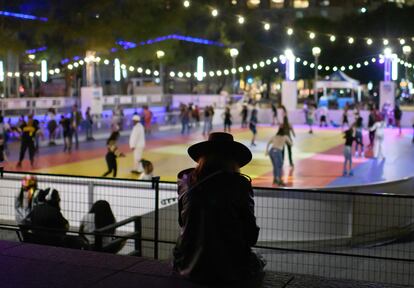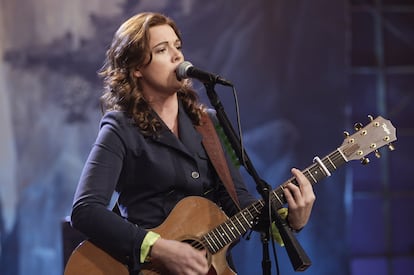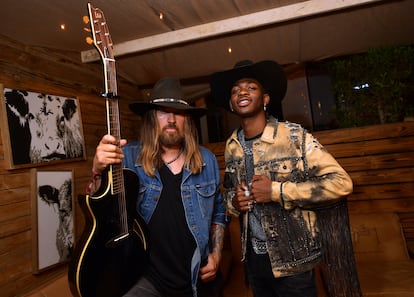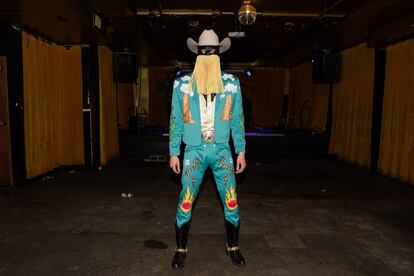‘We were pioneers when country wasn’t cool’: Beyoncé, remixes and festivals mark the return of the North American sound
The music genre has experienced a surprising evolution over the past century, finding a strange traveling companion along the way: digital culture

A brief metallic bikini, a bullfighter’s jacket and a glitzy black cowboy hat. That’s the aesthetic Beyoncé used to present in her latest single Texas Hold ‘Em. And no, she wasn’t bluffing: Queen B has embraced country music in a song that, with nearly 240 million plays on Spotify, has confirmed she is coming back with force.
With Latin urban music reaching maturity as the defining sound of the last decade; hip hop in a perennial state of grace; and traditional pop-rock settling discreetly into the background (from where it is unlikely to emerge soon), there are not a lot of remaining candidates to be the next big music trend. But if we look at what is happening on Instagram (and, to a lesser extent, on TikTok), country music seems to be the new old sound in enjoying a second youth, with singers and demographics not usually associated with the country music canon marking the difference.
If it’s true that Beyoncé has been slow to pay tribute to her Texas roots, it is no less true that her career is full of aesthetic nods to cowboy culture. Other distinguished African-American style references include Pharrell Williams, who filled his Louis Vuitton’s fall-winter 2024 collection with American western influences, or Dapper Dan, who sprinkled country details throughout his collaboration with Gap, where denim was king. The inclusion of figures and communities that have not traditionally been part of the country music scene is key to why the genre is having such a global impact.
At the end of 2018, rapper Lil Nas X released the song with Old Town Road, which sampled a banjo section from a Nine Inch Nails song. In the music video for the song, the rapper donned a whole series of cowboy outfits, while riding on the back of a horse and singing in a dance hall.

Lil Nas X had Old Town Road taken off Billboard’s Hot Country Songs, even though the track featured veteran country singer Billy Ray Cyrus. The song ended up being a huge hit: it launched the rapper’s career and swept the music awards. Less viral was the success of Orville Peck, a mysterious crooner who performs on stage dressed as a fancy cowboy, with his face hidden behind a fringed Lone Ranger mask. The man behind the mask of the celebrated gay cowboy is Daniel Pitout, the South African drummer of the punk band Nü Sensae. His first album as Orville Peck, Pony, was filled with tributes to Waylon Jennings and Tammy Wynette, and become one of the biggest indie sensations of 2019. And just as female country singers led by the openly gay Brandi Carlile have triumphed, so too have performers such as Sierra Ferrell, Nikki Lane or Whitney Rose, who have added an indie sensibility to the genre.
“I would compare what is happening now with country music with what happened [in Spain] in recent years, in which flamenco has been integrated into broader music trends. Now, in America, you see punk artists wearing cowboy hats. It’s a return to one’s roots,” says Marta García, a booker agent at Heart of Gold, a Spanish promoter of country music, who says the genre is growing among young Spaniards. “Artists like Nikki Lake or Sierra Ferrell attract a much younger audience than the average,” she says.
Bringing together country-loving audiences with people who may have felt excluded from the genre has been David Wrangler’s passion since 2007. That’s when he set up Vinyl Ranch, a creative space that is seeking — and succeeding — to transform the country’s image in the 21st century. “My brand sells an alternative perspective on country music, something like a Supreme meets Wrangler, a Warholian twist in the internet remix of the most American Wild West cowboy iconography,” says the creative director of Vinyl Ranch, which, after three decades, has established itself as a reference point in this new sensibility towards American roots.

David Wrangler created Vinyl Ranch in Houston, Texas, ground zero for urban cowboy culture in the late 1970s. It is this figure — the urban cowboy — that has inspired him since the start of his career. And it is perhaps also the key to the success of his brand, which continues to grow. Raised in a family of musicians, a young Wrangler cut his teeth as a DJ in gay bars and rave clubs in the early 2000s before giving birth to the Vinyl Ranch brand. “On a red-eye flight from Tulsa to Houston I met the original urban cowboy, Mickey Gilley of the famous Gilley’s nightclub, who gave his personal blessing to my vision.”
This experience served as the start gun for a brand that includes parties, remixes, a clothing line and a philosophy that lives largely on social media through memes and codes with one foot in the country tradition and the other in internet culture. “I can safely say that we have redefined and readjusted the norms of country music culture, making room for the birth and normalization of new subcultures in music, fashion and thought. It’s amazing to see how some of the biggest names in pop culture are copying, borrowing or stealing things we’ve created,” says Wrangler.
Indeed, Wrangler’s DJ alter ego Disko Cowboy — with his unprejudiced mix of country classics and club culture — has managed to attract an audience eager for novelty without scaring off the lifelong two-step aficionados. His latest release, a cover of Shania Twain’s That Don’t Impress Me Much with French Horn Rebellion and Kaitlin Butts, perfectly sums up his approach. Just browsing through the Instagram and TikTok accounts of festivals like Stagecoach or Gulf Coast Jam is enough to see that these experiences are closer to the trendy Coachella, and not at all the solemn event one might expect country music concerts to be.

“I grew up going to dance halls and country music clubs in Texas, and the DJ always knew they had to cater to everyone in the room without leaving out country music. You could hear the latest Alan Jackson single, a popular rap song and maybe the Electric Slide or a country remix and the dance floor wouldn’t empty out,” says Wrangler. That’s why, he believes, some festivals currently reflect this spirit “with a lineup focused on a mix of contemporary popular country, classic performances, new indie up-and-comers, fusion artists and DJs.”
Wrangler argues that country music is experiencing a moment of change that is conducive to its growth. “On the one hand there is Nashville, and on the other, everything else. The country music made there is like a product from Colgate or Nabisco: designed to look and sound good, but perhaps lacking in authenticity, artistry and substance,” he says. It seems, Wrangler adds, “that a large sector of fans is rebelling against the industry and choosing to spend their money on artists like Zach Bryan and Tyler Childers, who do not have hits on pop country radio, but are rather focused on controlling their own narrative and creating grassroots followers.”
Wrangler talks to EL PAÍS as he finalizes the details of the acquisition of his first nightclub. The energetic Texan is so convinced of his vision that it can be surprisingly contagious. “If you just discovered country music in 2024,” he notes, “you may not realize that artists’ merchandising wasn’t very cutting-edge or exciting until we got to work. The same goes for digital content: our country memes are everywhere.” He ends by proudly discussing what for him is the jewel in the crown of Vinyl Ranch: the experiences. “The parties and musical events we produce are born from the spirit of rave culture and punk attitude. A big record label doesn’t have people on staff who can replicate that spirit, but they can surely copy it. Every time I look at my phone, there is a new country party thrown by a giant like Live Nation or another promoter who wants to cash in on a trend we pioneered when country wasn’t cool.”
Sign up for our weekly newsletter to get more English-language news coverage from EL PAÍS USA Edition
Tu suscripción se está usando en otro dispositivo
¿Quieres añadir otro usuario a tu suscripción?
Si continúas leyendo en este dispositivo, no se podrá leer en el otro.
FlechaTu suscripción se está usando en otro dispositivo y solo puedes acceder a EL PAÍS desde un dispositivo a la vez.
Si quieres compartir tu cuenta, cambia tu suscripción a la modalidad Premium, así podrás añadir otro usuario. Cada uno accederá con su propia cuenta de email, lo que os permitirá personalizar vuestra experiencia en EL PAÍS.
¿Tienes una suscripción de empresa? Accede aquí para contratar más cuentas.
En el caso de no saber quién está usando tu cuenta, te recomendamos cambiar tu contraseña aquí.
Si decides continuar compartiendo tu cuenta, este mensaje se mostrará en tu dispositivo y en el de la otra persona que está usando tu cuenta de forma indefinida, afectando a tu experiencia de lectura. Puedes consultar aquí los términos y condiciones de la suscripción digital.








































